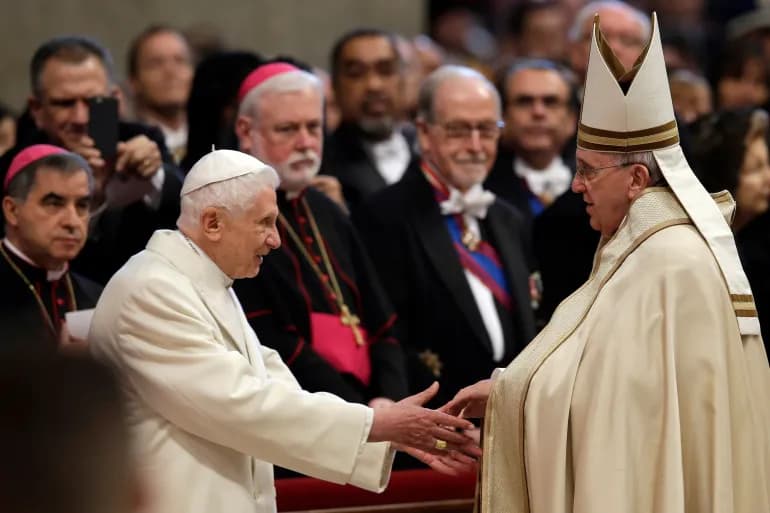ROME – In a new interview book about his relationship with his predecessor, Benedict XVI, Pope Francis said he was used in an “maneuver” to block Benedict’s election in the 2005 conclave, but that he resisted the move and voted for Benedict himself.
“It was a complete maneuver. The idea was to block the election of Cardinal Joseph Ratzinger,” he said in the book, titled “The Successor,” which consists of an interview with Spanish journalist Javier Martinez-Brocal with ABC Español.
On Sunday, ABC published an advanced chapter of the book, set for release in full on April 3, titled “Conclave,” in which Pope Francis recounts events that transpired during the Apil 18-19, 2005, conclave that elected Cardinal Joseph Ratzinger as Pope Benedict XVI after the death of John Paul II two weeks prior, on April 2 of that year.
The chapter begins with Pope Francis explaining how he made a lasting friend the night that the conclave ended, having befriended the pregnant owner of the Argentinian restaurant where he went to eat after it was over.
Francis in the chapter said the owner had a son, and that he has stayed in contact with the family and calls every year to wish the boy, who is now 18, a happy birthday.
After explaining that he had befriended the restaurant owner because the priest he was with had jested that he had almost been elected pope himself, Francis said, “In that conclave, the fact is known, they used me.”
While cardinals are sworn to secrecy on what happens during a conclave, Francis said “popes have license to tell it,” and went on to say that he started getting votes, and that at one point, 40 of the 115 cardinals in the conclave had put his name forward.
Those 40 votes “were enough to stop the candidacy of Cardinal Joseph Ratzinger, because, if they had continued voting for me, he would not have been able to reach the two-thirds necessary to be elected pope,” Pope Francis explained.
Asked whether he could have been elected at that time, he said “That was not the idea of those behind the votes.”
“The maneuver consisted of putting my name in, blocking the election of Ratzinger, and then negotiating a different, third candidate,” he said, saying fellow cardinals informed him later “that they did not want a ‘foreign’ pope.”
“They used me, but behind them they were already thinking about proposing another cardinal. They still couldn’t agree on who, but they were already on the verge of throwing out a name,” he said.
Francis said this maneuver happened in the second or third round of voting, on the morning of April 19, and that when he realized what was happening, he approached Colombian Cardinal Darío Castrillón, who passed away in 2018, and said, “‘Don’t joke with my candidacy, because right now I’m going to say that I won’t accept, eh? Leave me there.’”
“Then Benedict was elected,” he said, saying he himself voted for Ratzinger, who would become Pope Benedict XVI, because “He was the only one who at that time could be pope.”
After the “revolution” of the 27-year papacy of John Paul II, “who had been a dynamic pope, very active, with initiative, who traveled,” the Church, Francis said, needed “a pope who kept a healthy balance, a transitional pope.”
“If they had elected someone like me, who makes a lot of trouble, I wouldn’t have been able to do anything. At that time, it would not have been possible,” Pope Francis said, saying he left the conclave happy, and that Benedict XVI fit “the new style” the Church needed.
However, he noted that it was not an easy task for Benedict, who he said, “encountered a lot of resistance inside of the Vatican.”
Asked what the Holy Spirit was saying with Benedict’s election, Francis said the message was clear: “I rule here. There is no room for maneuvers.”
Benedict XVI, who shocked the world with his historic resignation from the papacy in 2013, was often caricatured as an ideological opponent of Pope Francis, particularly over issues such as the Traditional Latin Mass, priestly celibacy, and various aspects of the Church’s moral theology.
Francis himself has repeatedly hit back against this notion, insisting he and his predecessor enjoyed a good relationship, and that Benedict was a “wise grandfather” in the Vatican he could go to for advice.
However, it has also been said that Pope Francis was unhappy with the “two popes” image that developed after Benedict’s resignation, and that he sought in various ways to muzzle Benedict until his death on Dec. 31, 2022.
Pope Francis became the first pope in history to celebrate the funeral of his direct predecessor when he presided over Benedict’s funeral Mass on Jan. 5, 2023.
Follow Elise Ann Allen on X: @eliseannallen












